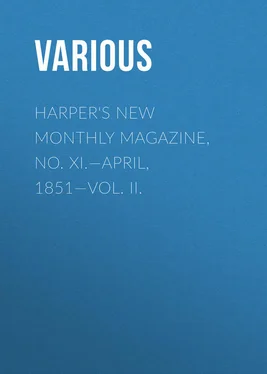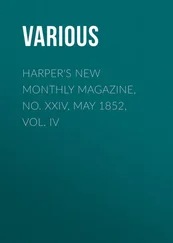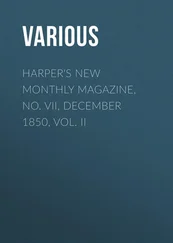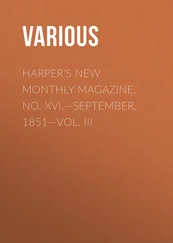Various - Harper's New Monthly Magazine, No. XI.—April, 1851—Vol. II.
Здесь есть возможность читать онлайн «Various - Harper's New Monthly Magazine, No. XI.—April, 1851—Vol. II.» — ознакомительный отрывок электронной книги совершенно бесплатно, а после прочтения отрывка купить полную версию. В некоторых случаях можно слушать аудио, скачать через торрент в формате fb2 и присутствует краткое содержание. Издательство: Иностранный паблик, Жанр: periodic, foreign_edu, на английском языке. Описание произведения, (предисловие) а так же отзывы посетителей доступны на портале библиотеки ЛибКат.
- Название:Harper's New Monthly Magazine, No. XI.—April, 1851—Vol. II.
- Автор:
- Издательство:Иностранный паблик
- Жанр:
- Год:неизвестен
- ISBN:нет данных
- Рейтинг книги:5 / 5. Голосов: 1
-
Избранное:Добавить в избранное
- Отзывы:
-
Ваша оценка:
- 100
- 1
- 2
- 3
- 4
- 5
Harper's New Monthly Magazine, No. XI.—April, 1851—Vol. II.: краткое содержание, описание и аннотация
Предлагаем к чтению аннотацию, описание, краткое содержание или предисловие (зависит от того, что написал сам автор книги «Harper's New Monthly Magazine, No. XI.—April, 1851—Vol. II.»). Если вы не нашли необходимую информацию о книге — напишите в комментариях, мы постараемся отыскать её.
Harper's New Monthly Magazine, No. XI.—April, 1851—Vol. II. — читать онлайн ознакомительный отрывок
Ниже представлен текст книги, разбитый по страницам. Система сохранения места последней прочитанной страницы, позволяет с удобством читать онлайн бесплатно книгу «Harper's New Monthly Magazine, No. XI.—April, 1851—Vol. II.», без необходимости каждый раз заново искать на чём Вы остановились. Поставьте закладку, и сможете в любой момент перейти на страницу, на которой закончили чтение.
Интервал:
Закладка:
"His second in command (for they were very differently organized from us) was still younger and more slim, but withal of equally determined and sailorlike appearance. Next to him was a junior officer, of whom I saw but little; but that little was enough to tell me that the executives under Captain De Haven would be efficient auxiliaries to him. Last of all, though not least among them, was one of whom I must be excused for saying more than a casual word or two. It was Dr. Kane, the surgeon, naturalist, journalist, &c., of the expedition. Of an exceedingly slim and apparently fragile form and make, and with features to all appearance far more suited to a genial clime, and to the comforts of a pleasant home, than to the roughness and hardships of an arctic voyage, he was yet a very old traveler both by sea and land. His rank as a surgeon in the American navy, and his appointment, at three days' notice, to this service, were sufficient proof of his abilities, and of his being considered capable of enduring all that would have to be gone through. While our captain was talking to the American commander, Dr. Kane turned his attention to me, and a congeniality of sentiment and feeling soon brought us deep into pleasant conversation. I found he had been in many parts of the world, by sea and land, that I myself had visited, and in many other parts that I could only long to visit. Old scenes and delightful recollections were speedily revived. Our talk ran wild; and there , in that cold, inhospitable, dreary region of everlasting ice and snow, did we again, in fancy, gallop over miles and miles of lands far distant, and far more joyous. Ever-smiling Italy, and its softening life; sturdy Switzerland, and its hardy sons; the Alps, the Apennines, France, Germany, and elsewhere were rapidly wandered over. India, Africa, and Southern America were brought before us in swift succession. Then came Spain and Portugal, and my own England; next appeared Egypt, Syria, and the Desert; with all of these was he personally familiar, in all had he been a traveler, and in all could I join him, too, except the latter. Rich in anecdote and full of pleasing talk, time flew rapidly as I conversed with him, and partook of the hospitality offered me. Delighted at the knowledge that I had been residing for some time in New York, he tried all he could to make me enjoy the moment."
After parting with the American Expedition, the "Prince Albert" took her homeward way, reaching Aberdeen on the 1st of October. "As it was quite dark," says Mr. Snow, "few witnessed our arrival, and I was not sorry for it". Had we returned fortunate, it would have been different; as it was, why, the night was, I thought, better suited to our condition. The "Prince Albert" brought the latest tidings received of the "Advance" and "Rescue," when
BROTHER JONATHAN GIVES JOHN BULL "A LEAD."
"If I had ever before doubted the daring and enterprising character of the American, what I saw and heard on board of the 'Advance' would have removed such doubt; but these peculiar features in the children of the Stars and Stripes were always apparent to me, and admiringly acknowledged. I was given a brief history of their voyage to the present time, as also an outline of their future plans. They intended to push on wherever they could, this way or that way, as might be found best, in the direction of Melville Island, and parts adjacent, especially Banks's Land; and they meant to winter wherever they might chance to be, in the Pack or out of the Pack. As long as they could be moving or making any progress, in any direction that might assist in the object for which they had come, they meant still to be going on, and, with the true characteristic of the American, cared for no obstacles or impediments that might arise in their way. Neither fears, nor the necessary caution which might easily be alleged as an excuse for hesitation or delay, at periods when any thing like fancied danger appeared, was to deter them. Happy fellows! thought I: no fair winds nor opening prospects will be lost with you; no dissension or incompetency among your executive officers exist to stay your progress. Bent upon one errand alone, your minds set upon that before you embarked, no trifles nor common danger will prevent you daring every thing for the carrying out of your mission. Go on, then, brave sons of America, and may at least some share of prosperity and success attend your noble exertions!
"If ever a vessel and her officers were capable of going through an undertaking in which more than ordinary difficulties had to be encountered, I had no doubt it would be the American; and this was evinced to me, even while we were on board, by the apparently reckless way in which they dashed through the streams of heavy ice running off from Leopold Island. I happened to go on deck when they were thus engaged, and was delighted to witness how gallantly they put aside every impediment in their way. An officer was standing on the heel of the bowsprit, conning the ship and issuing his orders to the man at the wheel in that short, decisive, yet clear manner, which the helmsman at once well understood and promptly obeyed. There was not a rag of canvas taken in, nor a moment's hesitation. The way was before them: the stream of ice had to be either gone through boldly or a long detour made; and, despite the heaviness of the stream, they pushed the vessel through in her proper course . Two or three shocks, as she came in contact with some large pieces, were unheeded; and the moment the last block was past the bow, the officer sung out, 'So: steady as she goes on her course;' and came aft as if nothing more than ordinary sailing had been going on. I observed our own little barky nobly following in the American's wake; and, as I afterward learned, she got through it pretty well, though not without much doubt of the propriety of keeping on in such procedure after the 'mad Yankee,' as he was called by our mate."
WHAT BECOMES OF ALL THE PINS?
Every body uses pins – men, women, and children. Every body buys them. Every body bends them, breaks them, knocks off their heads, and loses them. They enter into every operation, from the drawing-room to the scullery. Go where you will, if you look sharp, you may calculate with certainty on picking up a pin – in the streets, in the cabs, on door-steps and mats, in halls and drawing-rooms, sticking in curtains and sofas, and paper-hangings, in counting-houses and lawyers' offices, keeping together old receipts and bills, and fragments of papers, in ladies' needlework, in shopkeepers' parcels, in books, bags, baskets, luggage – they are to be found every where, let them get there how they may, by accident or design. Their ubiquity is astounding – and their manufacture, being in proportion to it, must be something prodigious. There is no article of perpetual use with which we are so familiar; and out of this familiarity springs indifference, for there is no article about whose final destination we are so profoundly ignorant. We know well enough the end of things (not half so useful to us) that wear out in the course of time, or that are liable to be smashed, cracked, chipped, put out of order, or otherwise rendered unavailable for further service; but of the fate of this little article, so universal in its application, so indispensable in its utility, we know nothing whatever. Nobody ever thinks of asking, What becomes of the Pins? For our own parts, we should be very glad to get an answer to that question, and should be very much obliged to any person who could furnish us with it.
The question is by no means an idle one. If we could get at the statistics of pins, we should have some tremendous revelations. The loss in pins, strayed, stolen, and mislaid, is past all calculation. Millions of billions of pins must vanish – no woman alive can tell how or where – in the course of a year. Of the actual number fabricated, pointed, headed, and papered up for sale from one year's end to another (remember they are to be found in every house, large and small, within the pale of civilization), we should be afraid to venture a conjecture; but, judging from what we know of their invincible tendency to lose themselves, and our own inveterate carelessness in losing them, we apprehend that, could such a return be obtained, it would present an alarming result. Think of millions of billions of pins being in course of perpetual disappearance! And that this has been going on for centuries and centuries, and will continue to go on, probably, to the world's end. A grave matter to contemplate, my masters! A pin, in its single integrity, is a trifle, atomic, in comparison with other things that are lost and never found again. But reflect for a moment upon pins in the aggregate. The grand sum-total of human life is made up of trifles – all large bodies are composed of minute particles. Years are made up of months, months of weeks, weeks of days, days of hours, hours of minutes, minutes of seconds; and, coming down to the seconds, and calling in the multiplication-table to enlighten us, we shall find that there are considerably upward of thirty-one millions of them in a year. Try a similar experiment with the pins. Assume any given quantity of loss in any given time, and calculate what it will come to in a cycle of centuries. Most people are afraid of looking into the future, and would not, if they could, acquire a knowledge of the destiny that lies before them. Pause, therefore, before you embark in this fearful calculation; for the chances are largely in favor of your arriving at this harrowing conclusion, that, by the mere force of accumulation and the inevitable pressure of quantity, the great globe itself must, at no very distant period, become a vast shapeless mass of pins.
Читать дальшеИнтервал:
Закладка:
Похожие книги на «Harper's New Monthly Magazine, No. XI.—April, 1851—Vol. II.»
Представляем Вашему вниманию похожие книги на «Harper's New Monthly Magazine, No. XI.—April, 1851—Vol. II.» списком для выбора. Мы отобрали схожую по названию и смыслу литературу в надежде предоставить читателям больше вариантов отыскать новые, интересные, ещё непрочитанные произведения.
Обсуждение, отзывы о книге «Harper's New Monthly Magazine, No. XI.—April, 1851—Vol. II.» и просто собственные мнения читателей. Оставьте ваши комментарии, напишите, что Вы думаете о произведении, его смысле или главных героях. Укажите что конкретно понравилось, а что нет, и почему Вы так считаете.












